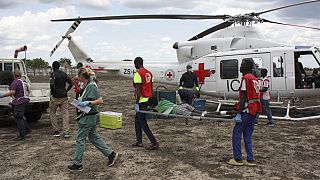Niger
The Niger River is overflowing in exceptional proportions, following days of heavy rain.
Niger's western region has been hardest hit by the floods, which have effectively shut down the capital, Niamey and destroyed local rice cultures.
At least 45 people had died as of August 28th, and the water has forced more than 226,000 residents from their homes.
The rainfall has been very important during this year's rainy season.
But other factors have contributed to the massive floods, such as the important erosion of the soils around Niamey and the deforestation of the river banks to produce charcoal and firewood.
All this makes slopes very runny, and great amounts of water go through.
In the short term, building dams could help contain future floods, but as such disasters are expected to happen more frequently, more long-term solutions must be found.
The best one, according to experts, is reforestation: planting new trees on the deforested banks.













Go to video
Alliance of Sahel States puts on show of unity through inaugural games
11:15
AI drones lead breakthrough against malaria in Africa [Business Africa]
01:06
South Africa declares state of disaster following severe weather
01:55
South African president visits flood sites with death toll at 78
00:51
At least 49 people have died in flooding in South Africa, officials say
01:00
Renewed calls to end plastic pollution on World Environment Day